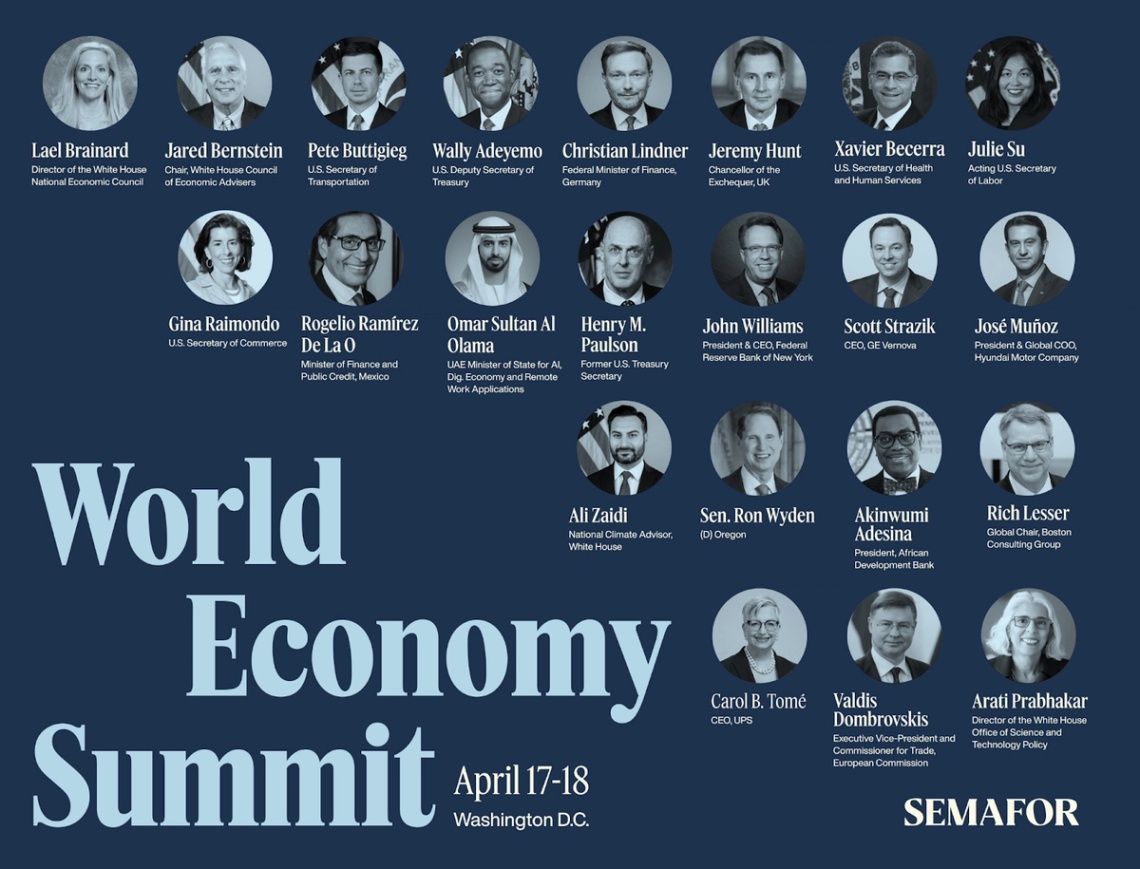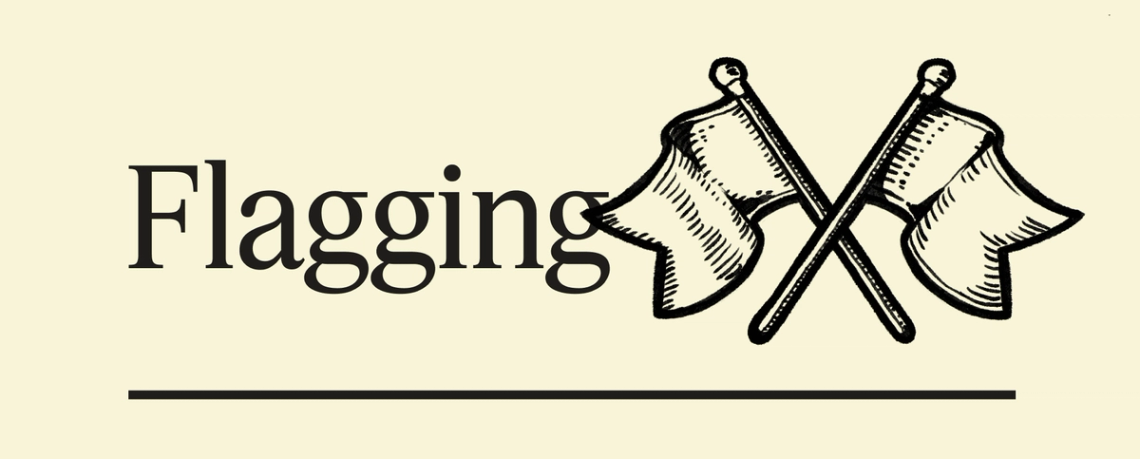| | The US economy outstrips the rest, the UK’s proposed ban on smoking takes a step towards reality, an͏ ͏ ͏ ͏ ͏ ͏ |
The World Today |  - US economy steams ahead
- Words vs action on China
- Ukraine aid pressure grows
- A way to end malaria
- Drought in Ecuador…
- …and floods in Dubai
- UN criticizes Israel
- UK smoking ban progress
- Copenhagen icon burns
- Space junk hits US house
 Parisians get on their bikes, and public art in Bruges. |
|
 With six sessions across two days and two stages, including the Gallup Great Hall, the 2024 World Economy Summit will showcase the most influential economic and business decision makers in the world, coming together for on-the-record interviews on the state of the global economic landscape. Each session will be streamed live, starting today at 9:30 a.m. ET with the Global Growth and Digital Infrastructure sessions. Later this afternoon, tune in for The Future of Mobility session starting at 2:30 p.m. ET. |
|
Fluctuating China-West ties |
 NARA/Creative Commons NARA/Creative CommonsThe growing dissonance between positive rhetoric and harsh reality in China-Western relations was on display in the U.S. and Australia. The U.S. and Chinese defense ministers held talks for the first time in 18 months ahead of a visit by the U.S. secretary of state to Beijing. Australia, too, has seemingly improved ties with China in recent months after relations hit historic lows. Yet U.S. President Joe Biden called today for a tripling of tariffs on Chinese steel and aluminum while a congressional committee alleged Beijing was subsidizing the production of drugs fueling the U.S. opioid crisis. Canberra, meanwhile, unveiled a national defense strategy that calls out Beijing’s alleged “coercive tactics.” |
|
Support for Ukraine gridlocked |
 Czech Prime Minister Petr Fiala. Elizabeth Frantz/Reuters Czech Prime Minister Petr Fiala. Elizabeth Frantz/ReutersEuropean pressure on the U.S. to increase aid to Ukraine butted up against Republican blowback in Congress. The Czech prime minister said during a visit to Washington that American support was critical, as Ukraine’s president said his country had “no chance of winning” the war without U.S. support. A decision by the House of Representatives speaker to ready a vote on military support for Ukraine has been opposed by members of his own party, though, threatening his hold on his job. Underlying the debate in Washington is a belief that the war will be stalemated without U.S. intervention. “That assumption is false,” the Institute for the Study of War wrote. Further delays “will lead to dramatic Russian gains.” |
|
GM mosquitoes offer malaria hope |
 Progress in developing genetically modified mosquitoes could one day end malaria, which still kills hundreds of thousands of people every year — most of them children in Africa. At the forefront of these efforts is Abdoulaye Diabaté, a Burkinabe scientist who last year won the Falling Walls prize for his research on the subject. Although initial results “are very promising,” Diabaté told Semafor Africa’s Alexis Akwagyiram, the rollout of the technology “will be a difficult and long process” that may take years before it can deliver results. Any successes would have a seismic impact on Africans’ health and wealth: According to a recent study, malaria reduces GDP growth by as much as 1.3% a year in some countries. |
|
 Ecuador began rationing electricity as a Latin America-wide drought linked to El Niño, a warm-weather pattern, depleted reservoirs at hydroelectric plants. El Niño has wreaked havoc on the water supplies of some of the region’s biggest cities, highlighting their vulnerability to rising global temperatures. Bogotá’s mayor asked residents to change their showering habits to reduce waste. Meanwhile Mexico City experienced its hottest day ever yesterday, raising risks that its dwindling water supplies will run out even faster than expected. Droughts in turn have led to water-trafficking: In some areas of Mexico, a local journalist wrote, powerful drug cartels have monopolized creeks and lakes to become the water providers of entire towns. |
|
Heavy rain shuts Dubai airport |
 Abdelhadi Ramahi/Reuters Abdelhadi Ramahi/ReutersDubai received the heaviest rain it has ever recorded, flooding major highways and closing the airport, among the world’s busiest. Nearly six inches of rain fell in 24 hours from Monday evening, around 1.5 times the country’s average annual rainfall. Dubai is — for obvious reasons — not prepared for heavy rain, with roads lacking drainage, so schools and the metro system also shut. Lightning repeatedly struck the Burj Khalifa, the world’s tallest building. At least one person died, and another 18 were killed in neighboring Oman. A couple told The Associated Press that the situation at the airport, where runways were underwater, was “absolute carnage … There’s people sleeping in the Metro station. There’s people sleeping in the airport.” Planes are being diverted to other regional airports. |
|
UN launches Israel critique |
|
Want to get under the skin of Europe’s major power? Sign up to The German Review to receive snappy analysis on German politics and current affairs directly to your inbox. Germany is a country in transformation - to understand how, sign up here. |
|
British smoking ban a step closer |
 A British plan to make smoking illegal passed its first parliamentary hurdle. The bill, introduced by Prime Minister Rishi Sunak last year, proposes to make it illegal to sell tobacco to anyone born in or after 2009, following a similar, since abandoned, New Zealand plan. Sunak’s Conservative Party is divided on the idea — nearly half of his parliamentary colleagues abstained or voted against it, and both his predecessors as PM criticized it. The opposition Labour Party, expected to win the coming election, supported it: One Labour politician said the bill would make sure “that young people today are even less likely to smoke than they are to vote for the Conservatives.” |
|
Iconic Copenhagen spire burns |
 Ida Marie Odgaard/Ritzau Scanpix via Reuters Ida Marie Odgaard/Ritzau Scanpix via ReutersFire devastated Copenhagen’s historic Old Stock Exchange building. The Børsen was built in the 17th century, and its spire dominated the Danish capital’s skyline. Half of the building, including the spire, has now collapsed: “This is our Notre-Dame,” one local told Danish TV, referring to the fire in the Paris cathedral five years ago. The stock exchange was surrounded by scaffolding for repair, as Notre-Dame had been. Staff, emergency services, and locals rushed to save hundreds of artworks: The Børsen contained one of Denmark’s most valuable collections, although much had been removed ahead of renovation. The cause of the fire remains unknown — the Notre-Dame blaze is believed to have been started by an equipment short-circuit or a worker’s cigarette. |
|
ISS garbage hits Florida home |
 NASA/Flickr NASA/FlickrNASA confirmed that an object which smashed through the roof of a Florida home was trash dropped from the International Space Station. The four-inch cylinder landed on March 8, shortly after a cargo pallet, jettisoned from the ISS in 2021, reentered the atmosphere, where it was expected to burn up. It’s the largest item discarded from the ISS, and one of hundreds of human-made objects that reenter the atmosphere annually. The odds of any one causing casualties are slim — Gizmodo reported that the European Space Agency tolerates risks of up to one in 10,000 — but as space becomes more crowded, the risk of injury increases. NASA may have to reimburse the Florida homeowner for damage, which seems fair enough. |
|
 - Greek private sector workers hold a 24-hour strike to protest against low wages.
- Croatia goes to the polls for parliamentary elections.
- The Grimm Variations, an anime adaptation of the Grimm brothers’ fairy tales, is released on Netflix.
|
|
 The percentage of journeys in central Paris made using a bike, compared to 4.3% by car. Walking and public transport remain the most popular modes of transport for Parisians, but cycling has jumped significantly, up from 3% in 2010. The city has cracked down on car journeys — pedestrianizing streets, increasing parking charges, and banning polluting vehicles — while boosting cycle infrastructure. Notably, in 2007 the city introduced the Vélib bikeshare system, which inspired similar programs in London and New York. |
|
 Bruges Triennial Bruges TriennialTwelve new art installations dot the Belgian city of Bruges as part of a newly opened cultural festival. This year’s Bruges Triennial, centered on the theme Spaces of Possibility, explores sustainability and livability within cities, reported Wallpaper. Sculptures on display include a pair of bronze boots on the Speelmansrei canal by the Colombian artist Iván Argote, and a work called Common Thread in the garden of a former monastery that uses fabric to connect two neighborhoods. |
|
| |